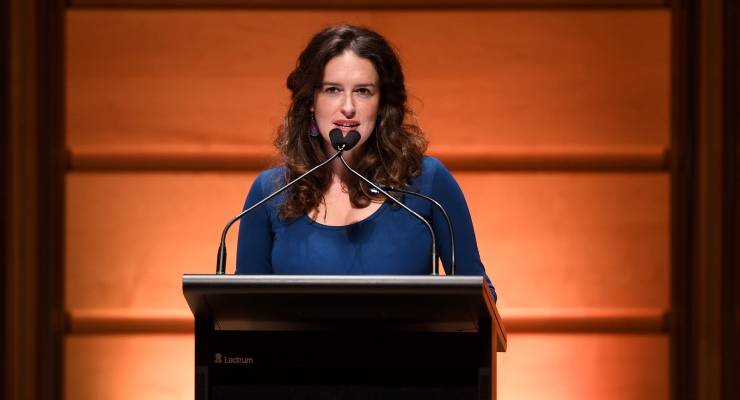
Over the past month, Google searches for domestic abuse hotlines have gone up by 75%.
As Australians have moved further into lockdown, many women and children are trapped inside with an abuser, exacerbating a crisis which was already a national scandal.
Last night author Jess Hill’s book on this topic, See What You Made Me Do, won the Stella Prize, a literary award for a book written by a woman. It’s a stunning book which examines every aspect of the topic with a forensic intelligence, offering new insights and workable solutions.
In her speech Hill said she was pleased to join “the pirate band of rabble-rousers” who had won the prize, which was established to address gender bias in literary prizes and space for reviews — both of which drive book sales.
The $50,000 Stella Prize was set up in 2013 after years of women being excluded from Australia’s premier literary prize, the Miles Franklin — women had won it only 11 times between 1957 and 2011. (Stella is Miles Franklin’s first name.)
Because of the lockdown, this year’s prize announcement was a virtual one, replacing champagne and canapés with a series of interviews with the finalists, judges and former PM Julia Gillard, enabling those of us at home to ogle everyone’s writing spaces.
Gillard, who is bringing out another book this year, said she was literally “all dressed up with nowhere to go”.
Hill, an award-winning journalist, said that the four years she spent writing the book had taken a “profound personal toll”; she had earned very little money, had a baby and spent every available hour researching and writing.
Domestic abuse is not a niche issue, or a women’s issue, she said:
“There are literally millions of us walking around who have experienced it – as adults or as children. What we also need to understand is that while all intimate relationships are vulnerable to abuse, domestic abuse is not inevitable. It is a social problem that can be solved. And it must be solved. But first, we have to believe that that is possible. That’s what I set out to prove with this book.”
Louise Swinn, the chair of the judging panel, said that See What You Made Me Do does much more than draw attention to domestic abuse — it offers solutions for reform.
“The statistics are utterly horrifying, and Hill’s extraordinary call to action cannot be ignored.”
Gillard introduced the announcement of the winner, saying that it was “vital to address gender bias in the literary world”.
“If women’s voices are disproportionately excluded from our storytelling then we cannot weave a more inclusive and richer shared culture,” she said.
Here, the former PM was echoing the sentiments of writer Rebecca Solnit, who argues that silence is a state that is imposed upon the powerless. When women’s stories are not heard, that is an act of silencing, she says.
Gillard said that years ago, reading Margaret Atwood’s Handmaid’s Tale and Anne Summer’s Damned Whores and God’s Police had helped her understand sexism and misogyny.
“It is not too much of a stretch to say I lived a different life that I otherwise would have because of the power of those books and so many others that have informed me, challenged me, shaped me,” Gillard said.
This year’s shortlist of six books was particularly strong. Other books included Tara June Winch’s lyrical book about indigenous culture, The Yield; There Was Still Love by Favel Parrett; Here Until August by Josephine Rowe; and Diving Into Glass, a memoir by Caro Llewellyn. Charlotte Wood’s novel about women and aging, The Weekend, was also on the list.
Hill said that the work of artists was vital in the current crisis.
“Even in the grimmest moments, you can hold despair in one hand and hope in the other,” she said.
If you or someone you know is impacted by sexual assault or violence, call 1800RESPECT on 1800 737 732 or visit 1800RESPECT.org.au.








Thanks Margot. I’ve seen some ads for this book and wondered what it’s like. The title grabbed my attention. It’s the number one catch phrase of every scumbag abuser.
It’s a hard topic to read about (and write about as well) but Jess has written a very good book that makes you feel that there are achievable solutions out there. It’s not just a misery read.
Yes it is a great title, isn’t it?
I started reading this book a few weeks ago, only to have it snatched away from me by a “friend” who shall remain nameless. Have just ordered another copy.
The brief bit I got to read was stunning and I’ve always admired Jess Hill’s writing.
It was a real thrill last night when I heard she’d won the prize.
Looking forward to reading the whole book.
I’m so pleased you bought two copies! She really did it tough, financially, while she was writing this so it’s great to think she is getting some money. Please tell me what you think of it.
I look forward to reading this. There have been so many compelling books on this subject to come out recently. No Visible Bruises by Rachel Louise Snyder and In the Dream House by Carmen Maria Machado were particularly impactful for me.